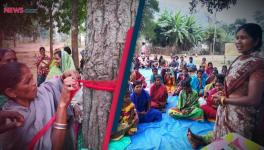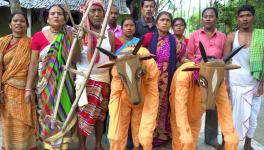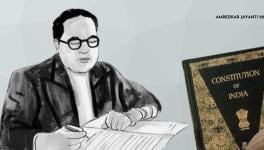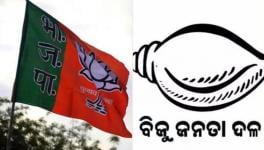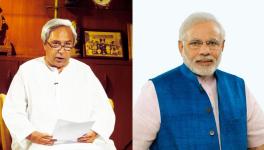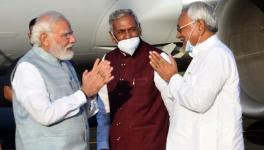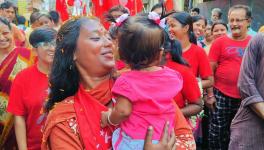Scientists' Statement: Against the Assault on Innovative and Creative Thinking
Newsclick interviewed Dr T. Jayaraman, Professor at TISS (Tata Institute of Social Sciences) on the joint statement by the scientific fraternity against the raising intolerance in India as he is one of the signatories to the letter. Jayaraman clarified that the motivation behind the scientists has nothing to do with any political affiliations and reminded that this is not the first time scientists are raising their collective voice. They had protested a decade back as well when the Vajpayee government was trying to introduce astrology in academics. He said, some statements from Mr. Modi and some remarks in the last Science Congress are misguiding for the student community. The ideas that creates intolerance in the society is actually the force safeguarding the existing societal issues also. It is not only harmful to the scientific temper but also to women and other marginalised sections in the country.

Rough Transcript:
Rishab Bailey (RB): Hello and welcome to Newsclick. Over the last couple of weeks the scientific community has joined the literary artistsic and film making community to protest against the rise in intolerance and perceived assault on reason in India. Over 600 hundred noted Indian scientists have issued three separate statements rejecting what one of the statements called the destructive narrow view of India that seeks to dictate what people will wear, think and eat and who they will love. To discuss the reasons behind the issuance of these statements we are joined by Dr. T. Jayaraman, Professor at Tata Institute of Social Sciences in Mumbai and who is also a signatory to one of these statements. Thank you for joining us Professor. Now, scientists are political creatures in the same way as the artists and authors might be. So why has so many noted scientists come together now to issue this statement. Most mainstream media channels would ask you where were you during the partition riots, the 84 riots, the Kashmir violence in 90s and so on. What is your response to this?
T. Jayaraman (TJ): Scientists do come out and speak on occasion as scientific community. They have done so before. One of the noted instances was during the Vajpayee government when the government introduced under the aegis of Dr. Murli Manohar Joshi then Minister for Education when they introduced courses on astrology and Vedic Mathematics in university education scientists maintained a strong campaign of protest. So scientist do come out and speak. They have spoken out in the 80s on the significance of scientific temper. So it is not that they don't speak. But scientists are also more careful than most communities, professional communities of speaking on issues on which they as a community or profession are not directly involved but are involved just like just any other citizen or on areas where there are others who are more expert and who are more qualified to speak. So they would on an issue like partition if you go back that far or even in the Sikh riots or things that happened subsequently other such incidence, scientists I am sure and I have done so myself, so I know a number of my colleagues they will participate as citizens in all kinds of campaigns or other such activity that goes on around them. You know, there are incidence that happen here that happen there but when you see the building up of the pattern of a systematic sort of spread of we have seen tolerance of unreason specially in the public sphere and unreason, outright obscurantist statements with regards to science misrepresenting our scientific past in this country when such issues come there is tipping point after which like any professional community you would say thus far and no further and at that point I think you want to stand up and speak.
RB: In one of the statements in fact the one of which you have signed, you have referenced the killing of Mohd. Akhlaq in Dadri and the three scholars were killed in Maharashtra and Karnataka over the last year or so. Now, the government has put down these as law and order problem these are the responsibility of the relevant state and government has said we are not in the power in that state in these particular states.
TJ: You know when incidence of this kind happens it is obvious in immediate sense that there is a law and order issue or issue of policing or control of crime and the state governments has to do it's best, put it's best foot forward and act but then if you miss the point that who are the forces, what is the kind of ideology that sets this kind of acts in motion if you wish then one is missing the point entirely. This is what you must focus on. So it is true that Dabholkar was assassinated the word is nor murder it is assassination was assassinated during the Congress regime in Maharashtra but what is the kind of ideology the mode of thinking that lets loose that forces that then attack people like Dabholkar who will be eventually responsible for the act of violence is a legal issue but where is the political and moral responsibility. It is those who let create this kind of discourse in society to create this climate of intolerance and hatred in some cases of violence.
RB: Now, the government seems anxious to brush off all these protests which have happened as disgruntled Leftists or Congress supporters who have been denied state patronage which they have been used to for so many decades.
TJ: Prof. M.S. Swaminathan who was not an original signatory but gave a very powerful letter of support to this signature campaign has served in every government. There is no government in this country that he has not approached irrespective of which political dispensation they belong to, to speak up for the cause of farmers in the country. So similarly you take former Director of Indian Institute of Science Dr. Balram. You take current serving Directors of many institutions who have signed. Many of these people I can assure you as one of the signatories, we are not even mutually aware what exactly are our voting inclinations are. In that sense very often in our scientific community we are politically speaking anonymous. But nevertheless, there is something that draws us together on this and we have spoke up and I may add that you know it was not a campaign in the sense of three or four people forming a team drumming up support. He just went through the internet on his own and when we reached about 100 people we said we are going to release it. It was the spontaneity of the response to the original draft which then everybody read and signed was remarkable.
RB: Now, the right wing attacks on views on History is something that is well known. That has happened previously also. Now, the current narrative that they have spread on this context that history is being controlled in past many decades by Left wing Historians or Marxist writers now just doing the balancing job of cleaning up of this sort of space. Given science is seen above objective and above politics can a similar narrative be spun around the work of scientific establishment in India?
TJ: I think there are two issues here. One is obviously those who try to pull this allegation of patronage of being pro-Congress or Marxist inspired etc. are on a specially weak footing when it comes to natural science because it it obvious that our work does not have any political implication in any direct sense. There may be secondary political implications that's a different matter. So we don't have direct political implications. So in this case, I think the accusation again is not worthy of much note. But with regarding to Historians having said this, I think the point about what rouses the ire of this rightists or should we say neo-rightists forces is this. You know their objection to a rational scientific study of History. They can't distinguish between the analysts school, the Marxists, the variety of streams of thought in History. So all they see is that the old way which was rapidly discredited post independence with the rise of influence of the historians like D.D. Kosambi who incidentally began as a Mathematician as a career. So with the comings of the historians of that kind the study and writing of the history in our country acquired a far more scientific reasoned basis and it was not about past glories, it was not a he-geographic account of kings. It was not singing the glories of the mythical past, it was rationale founded on evidence argued closely with the real contrast knowledge of what theoretical techniques you are applying and this obviously arouses the ire of those who like to create a mythical for their own immediate political gains in the present.
RB: Now, generally speaking there are two ways of looking at linkages between science and society and you have use of science as a method of technical advancement and development and of course inculcating what is referred to how government has relationship or how it is using or not using lies to spread sort of non rational temper is society. How this is rising. Given that we have many of BJP's top functionaries making ridiculous statements to India's past and so on. Do you think such attempt to paint glorious past helps spread this scientific temper in any way. Are more people likely to be interested in our scientific discourse historically because of these kinds of statements?
TJ: The point that you have made about the fact that science has an instrumental value. Here science means science and technology has an instrumental value. It is necessary for production modern industrial societies need a scientific knowledge. You need a scientific and technological human resources, you need people trained in these things. So that's one part of it. The other part of it we know that the coming of science, the study of science not automatically this I must emphasize not automatically but if science has to really penetrate a society, it must also bring the culture of science with it and the scientific culture which you may broadly, which Nehru brilliantly called the scientific temper is about applying a critical use of reason looking to evidence in order to understand both the natural and the social world. Like many years ago this phenomenon of Ganesha drinking milk so in that context even people you know the evidence was in front of you that Ganesha obviously no stones don't drink milk. So despite this, there is this sudden hesitation to use a critical faculty and say that's bogus. So I think, this disconnect, it is not true that they are totally disconnected because even if you train people to do science in India, we are very good at learning science, learning technology and applying it if we are told what to do we know what to do it. This is the whole basis of our IT industries outsourcing you know getting contracts etc. but our records on innovation is distinctly poor and why is that because innovation is about doing new things applying the critical faculty, innovation can not come by simply reading and learning what is in text books. So the absence of sufficient shall we say a movement or a larger social transformation that pushes people, the population at large towards a critical view of all things. That is what it holds it back from innovation. You know, when high officials like starting from Prime Minister talk of things like Ganesha and plastic surgery or make absurd claims about what was known or not known. Old story about how the Pushpak Viman is like a helicopter all the stuff you heard. So it takes away even the regular practice and understanding of science, doing it innovatively, it takes away from this. So why is that Hindutva is interested in this kind of campaign. I think their immediate, their ultimate target is not so much science. After all you know they love the bomb. It is not as if you say not that.. I am sure all their leaders have their mobile phones, they make very good use of social media so it is not that they spurn technology. But the idea is to instill in people that when you are told that these things are not to be questioned then they must heed and obey. Where else, where better to begin than with things that are considered absolutely objective namely natural science. So there I don't think eventually their target is science, eventually the target is the way on questions of gender, role of women in society, the empowerment of women, the upheaval that it creates in a traditional patriarchal society, the role of caste, it is on these issues that they really want people to heed and obey. So I think that's why you know the target in some sense is science because you attack what seems the most objective.
RB: That's really a insightful way to look at the situation and a really good note to end this interview on. Thank you so much Professor for joining us. I am sure that we will have you back on Newsclick very soon.
TJ: You are welcome.
DISCLAIMER: Please note that transcripts for Newsclick are typed from a recording of the program. Newsclick cannot guarantee their complete accuracy.
Get the latest reports & analysis with people's perspective on Protests, movements & deep analytical videos, discussions of the current affairs in your Telegram app. Subscribe to NewsClick's Telegram channel & get Real-Time updates on stories, as they get published on our website.










